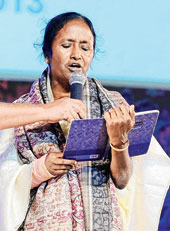 |
| Rasina Bewa sings one of her folk songs at Science City on Saturday. (Rashbehari Das) |
Rasina Bewa was ostracised by her fellow villagers in Murshidabad for 12 years but that only strengthened her resolve to continue with her calling — performing Muslim wedding songs and earning a living out of this dying art form.
“It was 1980 and I was just a couple of performances old when the opposition started. But I was determined that I would live outside the community if I had to but not give up this folk tradition,” Rasina told Metro.
On Saturday, the 60-year-old was inducted into The Telegraph Hall of Fame in The Telegraph School Awards for Excellence 2013.
“I am happy that I was given this prestige, on a stage that brings together students from privileged and not-so-privileged backgrounds. But I feel folk art and culture should be promoted in each and every school, so that students can be accomplished not in academics alone but also in the performing arts,” she said after receiving the award.
Rasina, who has studied till Class IX, started singing when she was five years old. Her mastermoshai Ananda Mohan had asked her if she would perform the Muslim wedding songs that she had “learnt from her grandmother” for a school programme.
The songs Rasina sings are for the many rituals that start seven days before a traditional Muslim wedding, like holud khela and kheer khawa.
In 1979, the resident of Durgapur village under Jibanti police station performed at the Murshidabad Halifax field, followed by a Rajya Sammelan in Berhampore the next year, which triggered the resentment.
A village elder told her husband: “Why are you allowing her to step out of the village and perform?” He threatened the family “with consequences” if Rasina continued with her singing.
These were not empty threats. Rasina’s husband and the husbands of a group of women who performed with her — Golbanu Bibi, Mehron Nesa, Saklema Bibi and Mahima Khatoon — were beaten up. But even physical force failed to daunt Rasina and her group. They started leaving the village before daybreak every day and travelling to far-off places to perform.
“With a bag tucked under our arm, we would leave the village while it was still dark,” Rasina recalled. The ostracism continued till the early 1990s.
There were other hardships too. The families of the women were not allowed use of the village tubewell and local grocers turned them away. “We would have to go to neighbouring villages to buy food items,” she said.
Rasina collected water from the shallow pumps meant to water the crop in the fields but didn’t give up her art.
Even the menfolk would get apprehensive about their safety. But Rasina’s answer to her farm labourer husband was clear. “What if something happens to you? Won’t I have to go out and earn then? Let me work now so that I can have the expertise. And given our financial needs, I think women should work.”
Over the years, Rasina started working on women’s empowerment, taking along girls and other women, “one by one to our programmes”.
The new girls saw how music was improving the lives of Rasina and her group and wanted to be a part of the change. “They saw what we were doing, how we were living and started comparing it with their own plight. They would go home and tell their families.”
Rasina says she has received much help from the Lok Sanskriti Parshad (now The Folk and Tribal Cultural Centre) of the state government, “then led by former members like Malini Bhattacharya and Muzaffar Hussain”, who inspired her to work for women’s empowerment in the area.
 |
| Barry O’Brien receives a jute doll from Rasina Bewa on behalf of The Telegraph Education Foundation at Science City on Saturday. Picture by Rashbehari Das |
From the early ’90s, she started coming on radio and receiving invitations from Birbhum, Howrah and Calcutta. Through the songs she wrote, Rasina started spreading awareness against dowry and for forestation and hygiene. “Rasinadi would lead us to the most distant of places if an invitation came,” smiled Golbanu Bibi, 50, who accompanied Rasina from Murshidabad to the Science City stage on Saturday.
Some years on, there was a change in mindset. The same village elders who had objected to her stepping out and performing wanted her to include other women in her group. “They asked me, ‘Would you alone earn a living from our folk art and not let other women in?’”
But Rasina didn’t just restrict herself to music and lyrics. From 1993, she learnt to use beads and jute to make crafts. On Saturday, she presented one such jute doll to The Telegraph Education Foundation. “I had enrolled under Tapati Karmakar and I would pay Rs 15 per month to learn the craft. But after a couple of months, Tapatidi told me that I needn’t pay anymore, instead she would pay me. Then I started making the handicrafts in large numbers,” Rasina said.
Today, the crusader teaches girls and women the craft and also promotes folk art like lathi-khela among schoolchildren.











